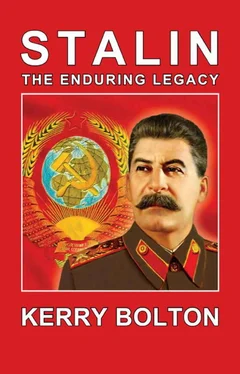In place of the Comintern the Cominform was established in 1947, for the purpose of instructing Communist parties to campaign against the Marshall Aid programme that was designed to bring war-ravished Europe under US hegemony. ‘European communism was to be redirected’ towards maintaining the gains of the Red Army during World War II. ‘Communist parties in Western Europe could stir up trouble’, against the USA. The Cominform was far removed from being a resurrection of the old Comintern. As to who was invited to the inaugural meeting held at a secluded village in Poland, ‘Stalin… refused a request from Mao Zedong, who obviously thought that the plan was to re-establish the Communist International’. The Spanish and Portuguese parties were not invited, nor were the British, or the Greek Communist Party, which was fighting a civil war against the royalists. [24] R Service, op. cit., 240-241.
The extent of the ‘fraternity’ between the USSR and the foreign Communists can be gauged from the delegates having not been given prior knowledge of the agenda, and being ‘treated like detainees on arrival’. While Soviet delegates Malenkov and Zhdanov kept in regular communication with Stalin, none of the other delegates were permitted communication with the outside world. [25] Ibid., 242.
Repudiation of Marxist Doctrine
The implementation of Marxism as a policy upon which to construct a State was of course worthless, and Stalin reversed the doctrinaire Marxism that he had inherited from the Lenin regime. Leon Sedov indignantly stated of this:
In the most diverse areas, the heritage of the October revolution is being liquidated. Revolutionary internationalism gives way to the cult of the fatherland in the strictest sense. And the fatherland means, above all, the authorities. Ranks, decorations and titles have been reintroduced. The officer caste headed by the marshals has been reestablished. The old communist workers are pushed into the background; the working class is divided into different layers; the bureaucracy bases itself on the ‘non-party Bolshevik’, the Stakhanovist, that is, the workers’ aristocracy, on the foreman and, above all, on the specialist and the administrator. The old petit-bourgeois family is being reestablished and idealized in the most middle-class way; despite the general protestations, abortions are prohibited, which, given the difficult material conditions and the primitive state of culture and hygiene, means the enslavement of women, that is, the return to pre-October times. The decree of the October revolution concerning new schools has been annulled. School has been reformed on the model of tsarist Russia: uniforms have been reintroduced for the students, not only to shackle their independence, but also to facilitate their surveillance outside of school. Students are evaluated according to their marks for behaviour, and these favour the docile, servile student, not the lively and independent schoolboy. The fundamental virtue of youth today is the ‘respect for one’s elders’, along with the ‘respect for the uniform’. A whole institute of inspectors has been created to look after the behaviour and morality of the youth. [26] Ibid.
This is what Leon Sedov, and his father, Leon Trotsky, called the ‘Bonapartist character of Stalinism’. [27] Ibid.
And that is precisely what Stalin represents in history: the Napoleon of the Bolshevik Revolution who reversed the Marxian doctrinal excrescences in a manner analogous to that of Napoleon’s reversal of Jacobin fanaticism after the 1789 French Revolution. Underneath the hypocritical moral outrage about Stalinist ‘repression’, etc., [28] Given that when Trotsky was empowered under Lenin he established or condoned the methods of jurisprudence, concentration camps, forced labour, and the ‘Red Terror’, that were later to be placed entirely at the feet of Stalin.
a number of salient factors emerge regarding Stalin’s repudiation of Marxist-Leninist dogma:
The ‘fatherland’ or what was called again especially during World War II, ‘Holy Mother Russia’, replaced international class war and world revolution.
Hierarchy in the military and elsewhere was re-established openly rather than under a hypocritical façade of soviet democracy and equality.
A new technocratic elite was established, analogous to the principles of German ‘National Bolshevism’.
The traditional family, the destruction of which is one of the primary aims of Marxism generally [29] Karl Marx, ‘Proletarians and Communists’, The Communist Manifesto, (Moscow: Progress Publishers, 1975), 68.
and Trotskyism specifically, [30] K R Bolton, ‘The State versus Parental Authority’, Journal of Social, Political & Economic Studies, Vol. 36, No. 2, Summer 2011, 197-217.
was re-established.
Abortion, the liberalisation of which was heralded as a great achievement in woman’s emancipation in the early days of Bolshevik Russia, was reversed.
A Czarist type discipline was reintroduced to the schools; Leon Sedov condemned this as shackling the free spirit of youth, as if there were any such freedom under the Leninist regime.
‘Respect for elders’ was re-established, again anathema to the Marxists who seek the destruction of family life through the alienation of children from parents. [31] K Marx, Communist Manifesto, op. cit.
What the Trotskyites and other Marxists objected to was Stalin’s establishment of the USSR as a powerful ‘nation-state’, and later as an imperial power, rather than as a citadel for world revolution. However, the Trotskyites, more than any other Marxist faction, allied themselves to American imperialism in their hatred of Stalinist Russia, and served as the most enthusiastic partisans of the Cold War. [32] See Chapter V.
Sedov continued:
Stalin not only bloodily breaks with Bolshevism, with all its traditions and its past, he is also trying to drag Bolshevism and the October revolution through the mud. And he is doing it in the interests of world and domestic reaction. The corpses of Zinoviev and Kamenev must show to the world bourgeoisie that Stalin has broken with the revolution, and must testify to his loyalty and ability to lead a nation-state. The corpses of the old Bolsheviks must prove to the world bourgeoisie that Stalin has in reality radically changed his politics, that the men who entered history as the leaders of revolutionary Bolshevism, the enemies of the bourgeoisie,◦– are his enemies also. Trotsky, whose name is inseparably linked with that of Lenin as the leader of the October revolution, Trotsky, the founder and leader of the Red Army; Zinoviev and Kamenev, the closest disciples of Lenin, one, president of the Comintern, the other, Lenin’s deputy and member of the Politburo; Smirnov, one of the oldest Bolsheviks, conqueror of Kolchak—today they are being shot and the bourgeoisie of the world must see in this the symbol of a new period. This is the end of the revolution, says Stalin. The world bourgeoisie can and must reckon with Stalin as a serious ally, as the head of a nation-state…. Stalin has abandoned long ago the course toward world revolution. [33] L Sedov, op. cit., ‘Reasons of Foreign Policy’.
As history shows, it was not Stalin to whom the ‘world bourgeoisie’ or more aptly, the world plutocracy, looked on as an ally, but leading Trotskyites whose hatred of Stalin and the USSR made them vociferous advocates of American foreign policy.
Family Life Restored
Leon Trotsky is particularly interesting in regard to what he saw as the ‘revolution betrayed’ in his condemnation of Stalinist policies on ‘youth, family, and culture’. Using the term ‘ Thermidor ’, taken from the French revolutionary era, in his description of Stalinism vis-à-vis the Bolshevik revolution, Trotsky began his critique on family, generational and gender relations. Chapter 7 of The Revolution Betrayed is worth reading in its entirety as an over-view of how Stalin reversed Marxism-Leninism. Whether that is ‘good’ or ‘bad’ is, of course, left to the subjectivity of the reader. [34] L Trotsky, The Revolution Betrayed, Chapter 7, ‘Family, Youth and Culture’, http://www.marxists.org/archive/trotsky/1936/revbet/ch07.htm
Читать дальше












